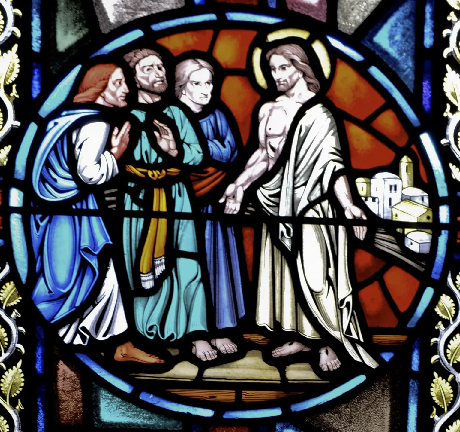THE APOSTLES’ CREED & RESURRECTION
PMW 2023-035 by Kenneth L. Gentry, Jr.

Toward the end of the Apostles’ Creed we declare with the universal, historic, corporate Christian church that we believe “in the resurrection of the body and the life everlasting.” According to Philip Schaff (The Creeds of Christendom, 1:22), in the original language versions of the Creed, the resurrection of the “body” is more exactly declared to be the resurrection of the “flesh.” For in Latin the word carnis was used and in Greek sarkos.
We know that the resurrection is a physical resurrection of the dead body for: (1) all forerunner resurrections (though temporal only) were physical resurrections of the flesh (e.g., John 11:43–44). (2) Old Testament prophecies speak of the resurrection of the flesh (Job 19:25–27; Isa. 26:19–20). (3) Jesus’ own resurrection was a physical of the flesh (σάρκα καὶ ὀστέα; Luke 24:39). (4) Thomas was rebuked by Jesus for not believing he was physically resurrected (John 20:24–29). And (5) Jesus’ resurrection was the “first-fruits” of the eschatological resurrection (1 Cor. 15:20), showing that just as the first-fruits of a wheat crop is wheat, so the first-fruits of the resurrection is like Jesus’: of the flesh.
Furthermore, Scripture speaks of the general resurrection as occurring at one time (John 5:27–29). It occurs at the end of history on “the last day” (John 6:39, 40, 44, 54). When Martha spoke of her belief that her brother Lazarus’ resurrection would be on “the last day” (John 11:24), Jesus did not correct her in any way.
This declaration of belief was an important counter to unbelief from without and Gnostic intrusions within the Christian faith. We see denials of the resurrection of the flesh, not just in modern liberalism, but in antiquity. The Sadducees denied it (Matt. 22:23; Acts 4:1–2; 23:6–8). Jesus even rebuked them for denying the idea of resurrection, noting that they “did not understand the Scriptures nor the power of God” (Matt. 22:29). This is invariably the reason liberals today deny the resurrection, for they care nothing for the Scriptures as God’s word nor do they even recognize the power of God.
The Athenians scoffed at Paul because of it (Acts 17:18, 32). There we read: “Some of the Epicurean and Stoic philosophers were conversing with him. Some were saying, ‘What would this idle babbler wish to say?’ Others, ‘He seems to be a proclaimer of strange deities,’—because he was preaching Jesus and the resurrection” (Acts 17:18). A little further into the context we see how vehemently these unbelievers derided Paul: “Now when they heard of the resurrection of the dead, some began to sneer, but others said, ‘We shall hear you again concerning this’” (Acts 17:32).
Hymenaeus and Philetus claimed that it has already occurred in Paul’s day. Thus, we read Paul’s exhortation to Timothy: “avoid worldly and empty chatter, for it will lead to further ungodliness, and their talk will spread like gangrene. Among them are Hymenaeus and Philetus, men who have gone astray from the truth saying that the resurrection has already taken place, and they upset the faith of some” (2 Tim. 2:16–18). Apparently they believed that it was a spiritual resurrection that was undetectable and therefore irrefutable.
There was a disruptive faction in Corinth that also doubted the physical resurrection of the dead. In 1 Corinthians 15:12–17 Paul warned that this destroyed salvation, if true:
“Now if Christ is preached, that He has been raised from the dead, how do some among you say that there is no resurrection of the dead? But if there is no resurrection of the dead, not even Christ has been raised; and if Christ has not been raised, then our preaching is vain, your faith also is vain. Moreover we are even found to be false witnesses of God, because we testified against God that He raised Christ, whom He did not raise, if in fact the dead are not raised. For if the dead are not raised, not even Christ has been raised; and if Christ has not been raised, your faith is worthless; you are still in your sins.”
Christians do well to hold to our faith in the physical resurrection of the body. For two reasons: because (1) Scripture teaches it and (2) God’s omnipotence allows it. Then as a happy consequence: the historic Christian church has publicly, formally, universally, corporately affirmed it because it is the faith once for all delivered to the saints. In fact, the writer of Hebrews deemed the resurrection and the final judgment as “elementary” principles of the faith, when he exhorts these Hebrew Christians: “Therefore leaving the elementary teaching about the Christ, let us press on to maturity, not laying again a foundation of repentance from dead works and of faith toward God, of instruction about washings and laying on of hands, and the resurrection of the dead and eternal judgment.”
In the middle of the Apostles’ Creed we read that Christ “rose again from the dead” (which we know he did in his physical body due to the empty tomb, Luke 24:1-3). This obviously is a backdrop to the final wording that says “I believe in the resurrection of the body (i.e., flesh).”
The Christian faith: Don’t leave the world without it! And be wary of Lone Exegetes for Jesus who set themselves over against the universal, historic, public faith of Christianity.

Blessed Is He Who Reads: A Primer on the Book of Revelation By Larry E. Ball
A basic survey of Revelation from an orthodox, evangelical, and Reformed preterist perspective. Ball understands John to be focusing on the destruction of Jerusalem and the temple in AD 70. Insightful. Easy to read.
For more Christian studies see: www.KennethGentry.com
Kenneth L. Gentry Jr.'s Blog
- Kenneth L. Gentry Jr.'s profile
- 85 followers



